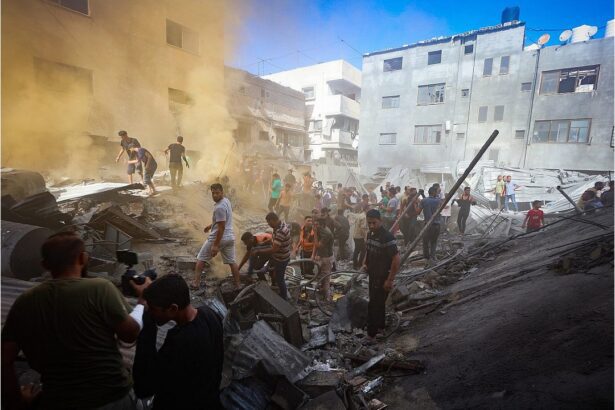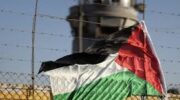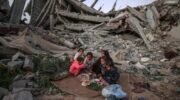The Israeli army uses the veneer of internal accountability to fend off external criticism. But its record reveals how few perpetrators are punished.
As these accusations pile up, Israel is beginning to launch another large-scale operation alongside its ongoing military campaign: the biggest crime cover-up in the country’s history.
by Dan Owen, reposted from +972 Magazine, July 24, 2024
The scale of horror that Israel has inflicted upon Gaza over the last nine months is almost impossible to comprehend. The Israeli army’s decision from the start of the war to significantly expand its authorization for bombing non-military targets and causing harm to civilians has resulted in the killing of tens of thousands of Palestinians, and has left the Gaza Strip unrecognizable. The surviving population faces mass hunger and displacement as a result of intentional Israeli policies, which are in violation of international laws of war.
Every day, more and more horrifying evidence emerges, revealing what many Israelis seek to repress. The South African case charging Israel with genocide continues in the International Court of Justice (ICJ). The Prosecutor of the International Criminal Court (ICC) has requested arrest warrants for Israeli Prime Minister Benjamin Netanyahu and Defense Minister Yoav Gallant for suspected war crimes and crimes against humanity.
A UN Human Rights Council Commission found that Israeli security forces committed crimes such as starvation, murder, intentional harm to civilians, forced transfer, sexual violence, and torture. Even the United States, Israel’s closest ally, concluded that Israel’s use of weapons in Gaza is “inconsistent” with human rights law.
As these accusations pile up, Israel is beginning to launch another large-scale operation alongside its ongoing military campaign: the biggest crime cover-up in the country’s history.
Israeli leaders and diplomats repeat ad nauseam the well-worn mantra that Israel’s army is the most moral in the world. This claim is based, among other things, on the military’s supposedly robust legal mechanisms that ostensibly approve every attack and investigate suspicions of international law violations. In its arguments at the ICJ against the accusation that Israel is committing genocide, Israel’s defense team repeatedly praised these legal mechanisms: even if Israeli soldiers commit war crimes, the lawyers argued, the system is capable of investigating them on its own.
However, a new report that I authored for the human rights group Yesh Din shows how the main role of Israel’s military law enforcement system is to maintain the appearance of internal accountability in order to shield itself from external criticism.
Indeed, +972 Magazine and the Guardian recently revealed that Israeli intelligence agencies surveilled the activities of the ICC, in part to determine which incidents were being referred to the prosecutor’s office for investigation; in doing so, Israel could retroactively open investigations into those same cases and then reject the ICC’s mandate on the grounds of the “principle of complementarity.”
Illusion of accountability
At the end of May, Israel’s Military Advocate General (MAG), Yifat Tomer-Yerushalmi, announced that she had ordered criminal investigations into at least 70 incidents of suspected war crimes in Gaza. This came after the military referred hundreds of incidents to the General Staff Fact-Finding Assessment Mechanism (FFAM), a military body intended to conduct an initial and rapid examination of suspected violations of international law, before the MAG decides whether or not to open a criminal investigation.
Allegedly, these are signs of Israel’s commitment to upholding the laws of war. However, an examination of the past decade of Israeli assaults on Gaza — including the 2014 offensive known as “Protective Edge,” the repression of the 2018-19 Great March of Return, and the 2021 operation known as “Guardian of the Walls” — show that it is extremely unlikely that Israel has any intention to properly investigate, punish, or prevent war crimes.
Since 2014, hundreds of incidents that raised suspicions of war crimes were brought to the attention of the military. The vast majority of these were transferred to the FFAM, but were closed without a criminal investigation after being “reviewed” by the mechanism’s staff for unreasonably long periods. For example, some cases concerning potential violations from 2014 were still under review by the FFAM in 2022.
The work of the FFAM and the composition of its members remains confidential, so we will likely never learn the details of its examination process or the rationale behind closing cases without an investigation. Yet whether recommended by the FFAM or not, most criminal investigations opened by the MAG and conducted by the military police have been closed without charging any soldiers or commanders.
Out of nearly 600 incidents in Gaza from the past 10 years that raised suspicions of law violations and whose outcomes are known, only three investigations — one per military offensive — resulted in indictments. Even in these rare instances, whitewashing remains central to the military’s tactics, with the perpetrators avoiding harsh punishment.
Adding to the military’s consistent failure to handle suspicions of war crimes is the fact that, to date, the Israeli law enforcement system has not addressed Israel’s policies regarding the use of force and has refrained from investigating government and military decision-makers.
In other words, those directly responsible for the unfolding disaster in the Gaza Strip — who expanded the army’s targeting of innocent civilians, dictated Israel’s bombardment and open-fire guidelines, restricted humanitarian aid, and designated entire areas in the Gaza Strip as kill zones — will likely remain unpunished in Israel.
This stems in part from an inherent conflict of interest within the law enforcement system. The Attorney General and the Military Advocate General, tasked with investigating and prosecuting suspected breaches of international law, also serve as legal advisors for approving Israel’s lethal policies in Gaza. It is difficult to envision how any of these bodies will now initiate a genuine and thorough investigation into a policy they themselves helped formulate.
Dan Owen is a researcher at Yesh Din and the author of the report ‘The General Staff Whitewashing Mechanism: The Israeli law enforcement system and breaches of international law and war crimes in Gaza.’
RELATED:
-
- Israeli Army Self-Investigates: No Violations During Gaza Border Protests (excerpts and commentary)
- ‘I’m bored, so I shoot’: The Israeli army’s approval of free-for-all violence in Gaza
- The day Israeli tanks fired directly at AFP’s Gaza Bureau
- Spying & threats: Israel spent 9 years trying to keep the ICC off the trail of Israel’s war crimes





